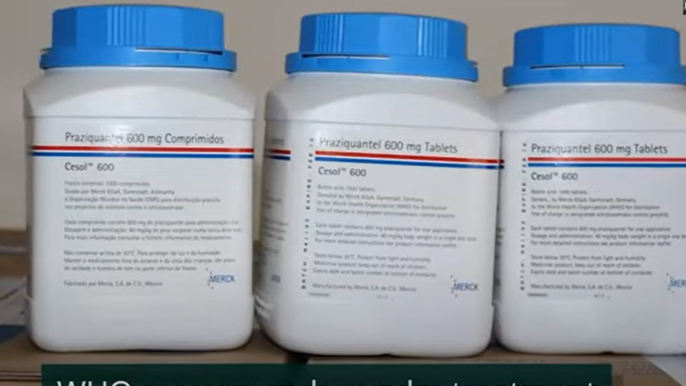
LSTM’s Professor Russell Stothard has worked with an international team of researchers to undertake a companion review of the scientific rationale behind the newly issued 2022 WHO guideline on control and elimination of schistosomiasis.
The review, published in the journal Lancet Infectious Diseases, was undertaken by multi-author team, the WHO 2018–2022 Schistosomiasis Guidelines Development Group, with several others who have made significant contributions to underlying systematic reviews.
Schistosomiasis is a caused by helminth parasite infecting up to 250 million people worldwide. In 2001, the World Health Assembly passed a resolution that defined a new global strategy for control of schistosomiasis through preventive chemotherapy programmes. This resolution culminated in the 2006 WHO guidelines that recommended empirical treatment by mass drug administration with praziquantel, predominately to school-aged children in endemic settings at regular intervals. Since then, school-based and community-based preventive chemotherapy programmes have been scaled up, reducing schistosomiasis-associated morbidity.
Over the past 15 years, new scientific evidence—combined with a more ambitious goal of eliminating schistosomiasis as a public health problem and an increase in the global donated supply of praziquantel—has highlighted the need to update public health guidance worldwide, leading to the new WHO Guidelines, which were published earlier this year.
The WHO's six recommendations provide an updated public health strategy against schistosomiasis and the review highlights their actions as new anchor points to rally support across much needed multi-sectoral activities, while also discussing several future public health challenges such as the need to adopt a OneHealth approach.
A key recommendation is an expansion in the eligibility of preventive chemotherapy to everyone, from aged two years and above. This builds a stronger case for more equitable and effective interventions in child health. Professor Russell Stothard said: "When I first came to the LSTM just over 10 years ago, the plight of pre-school-aged children with schistosomiasis was largely ignored. Today, more equitable treatment of these younger children is now endorsed at the highest policy levels. It's pleasing to see how my own research, and that of others within the LSTM, has played a formative role to overcome this neglect".
First author Nathan Lo, Faculty Fellow in Infectious Diseases, University of California, San Francisco said:
"These guidelines are an exciting step forward in expanding access to praziquantel, with a goal of averting the preventable disease and inequity caused by schistosomiasis."
The WHO Guideline was launched in March 2022 with a recorded webinar that features the perspective and reflections from several international stakeholders.
In areas where genital schistosomiasis is common, new synergies within women's health are strongly encouraged with management of cervical cancers and up-scaled Human Papilloma Virus screening. This includes integration of interventions against female genital schistosomiasis within this wider public health repertoire for improved access to basic gynaecological services for vulnerable women across sub-Saharan Africa.
Nathan C Lo, Fernando Schemelzer Moraes Bezerra, Daniel G Colley, Fiona M Fleming, Mamoun Homeida, Narcis Kabatereine, Fatma M Kabole, Charles H King, Margaret A Mafe, Nicholas Midzi, Francisca Mutapi, Joseph R Mwanga, Reda M R Ramzy, Fadjar Satrija, J Russell Stothard, Mamadou Souncalo Traoré, Joanne P Webster, Jürg Utzinger, Xiao-Nong Zhou, Anthony Danso-Appiah, Paolo Eusebi, Eric S Loker, Charles O Obonyo, Reginald Quansah, Song Liang, Michel Vaillant, M Hassan Murad, Paul Hagan, Amadou Garba,
Review of 2022 WHO guidelines on the control and elimination of schistosomiasis.
The Lancet Infectious Diseases,
2022,ISSN 1473-3099,
https://doi.org/10.1016/S1473-3099(22)00221-3.